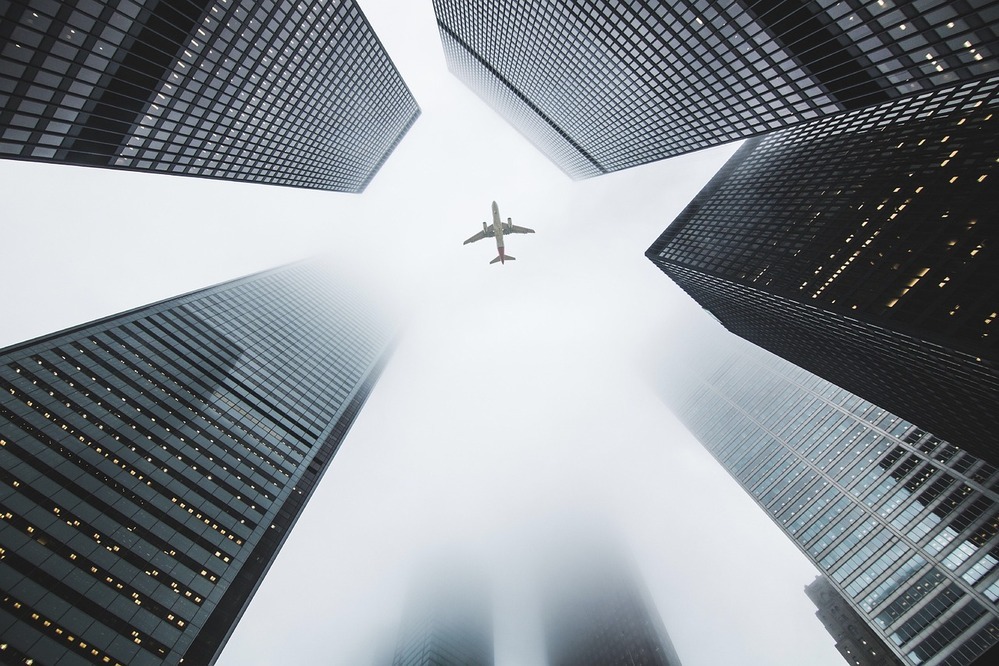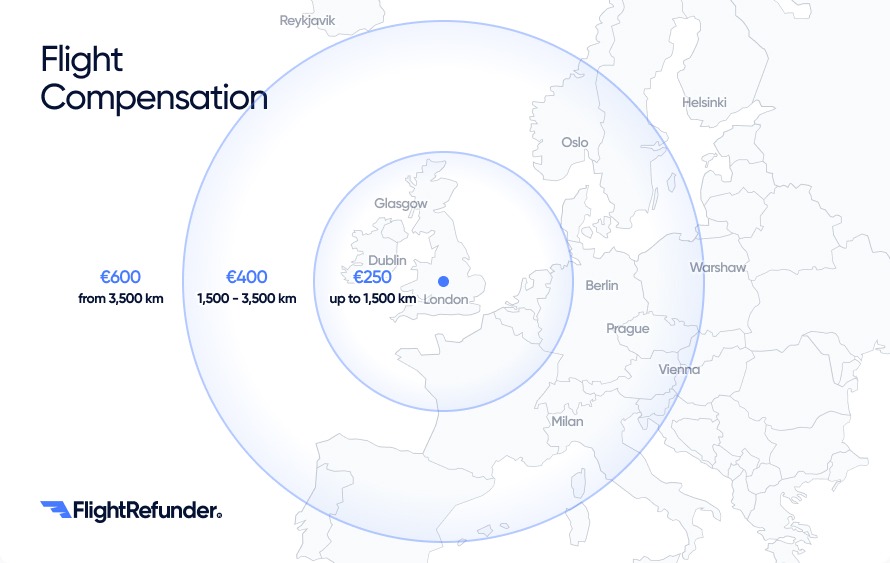Did you know that dense fog causes nearly 10% of all flight delays worldwide, throwing travel plans into chaos and frustrating countless passengers? Even though modern aircraft are equipped to handle low-visibility conditions, thick fog can still force airlines to delay or cancel flights for safety reasons.
In this guide, we’ll answer the question “Can planes take off in fog?” and explore how fog impacts visibility, takeoffs, and landings. We’ll also explain the safety measures airlines and airports implement during foggy weather and share practical tips to help you prepare, adjust your expectations, and reduce the stress of flying in low-visibility conditions.

Why Are Flights Canceled or Delayed Due to Fog?
Fog reduces visibility by creating a layer of tiny water droplets close to the ground, making it difficult for pilots to see crucial visual markers during takeoff, landing, or while navigating the runway. In dense fog, visibility can become so poor that flying is deemed unsafe. Airports implement safety protocols, such as increasing the distance between aircraft and utilizing advanced landing systems. However, if the fog continues, planes may experience significant delays or even cancellations. In such cases, passengers may find their flight cancelled or delayed due to weather, leading to unexpected disruptions in travel plans. Being informed about this possibility can help you prepare and understand your options should weather impact your journey.
Quick Travel Tips for Foggy Days
✅ Check Flight Status Early: Monitor your flight status 24-48 hours before departure.
✅ Download Airline Apps: Stay updated with real-time alerts on schedule changes.
✅ Book Morning Flights: Fog tends to lift by midday, reducing the risk of delays.
✅ Pack Essentials: Include snacks, a portable charger, and essentials in your carry-on in case of delays.
✅ Know Your Rights: Under EU261, you may be entitled to meals, hotel stays, or rebooking during long delays.
The Process of Flight Delay Due to Fog
When fog delay flights several steps are taken. First, weather experts check the airport’s visibility. If fog makes it hard to see, they send warnings to the people who manage air traffic and the airlines. Then, flights are changed: some leave later, stay in the air longer or go to different airports. Passengers are told about the delays in different ways. On the ground, workers might need to remove ice from planes and get ready for the changes. Once the fog clears and it’s easier to see, flights start again, but there might be a lot of flights to catch up on. Airlines try to fix the problems and get back to their regular schedules.
The Process of Canceling a Flight Due to Fog
In thick fog, airlines may need to stop flights to ensure safety. Weather experts monitor the situation and inform plane guides and airlines. If the fog persists, airlines decide to stop flights. If stopped, passengers are informed via email, text, or phone, and offered options like changing flights, finding alternative travel, or receiving refunds. The airline’s team collaborates with plane guides to adjust flight times, assist passengers, and ensure safety by changing crew schedules.
How Do Airlines Act If a Flight Is Canceled or Delayed Due to Fog?
Airlines like British Airways, Lufthansa, and Delta Air Lines handle fog-related delays by providing passengers with information, alternative flights, accommodation, refunds, and compensation. They also offer overnight accommodations and do not charge extra for changing flights during bad weather. These policies prioritize passenger safety and adhere to clear visibility rules set by air travel control. Some airlines offer full refunds or compensation for large delays, while others provide accommodations and food for long delays.
What To Do If Flight Is Canceled or Delayed Due to Fog
Fog can cause delays or cancellations in flights, impacting passengers’ options and rights. Airlines prioritize safety and must inform passengers about flight changes. If a flight is cancelled, passengers can choose a new flight or money back. Airlines should provide food, drinks, hotel rooms, and communication options for long-term delays. Travel insurance may help cover additional costs. To prepare, check flight status, receive updates, pack essentials, and explore alternative travel options. Embrace these decisions, even if they’re challenging, to ensure everyone’s safety. Generally, here are a few things to note:
- 🌧️ The decision to cancel or delay a flight due to bad weather is at the discretion of the airline and is based on safety considerations.
- 🛂 Passengers have certain rights if their flight is canceled or delayed due to bad weather, such as assistance with rebooking or refunds.
- 📄 Passengers should check their airline’s policy regarding disruptions in adverse weather conditions and travel insurance coverage before flying.
- 📱If a flight is delayed or canceled due to bad weather, passengers should stay in touch with their airline for updates and possible accommodation.
- 💼 In cases where the airline is responsible for a disruption, such as a flight delayed due to poor de-icing procedures, passengers may be entitled to compensation under EU regulations.
- ⚠️ Passengers should also take care of their own safety and well-being in adverse weather conditions and follow all instructions from airport or airline staff.
Pro Traveler’s Tip: Save all receipts for food or hotels during delays — airlines may reimburse even for weather-related disruptions.
The Right to Compensation If the Flight Is Canceled or Delayed Due to Fog

EU Regulation 261/2004, which started in 2005, helps protect people who fly by giving them money if their flight has problems. However, the flight must have originated within the EU or landed in the EU. In the latter case, the airline must be based in the EU. If a flight is delayed, canceled, or too full, passengers can get money from the airline. The amount they get depends on how far they are flying: 250 euros for short flights, up to 600 euros for very long ones. Sometimes, airlines don’t have to pay if something big and unexpected, like bad weather or big problems in a country, causes the delay.
Late flight refunds can be requested up to 6 years after the flight, provided the flight is at least 3 hours late. To claim refunds, check in on time and present your boarding pass, ticket, and airline note. Use websites or apps to check the status of your flight. Some airlines may refuse refunds or offer special circumstances, allowing you to claim your refund.
Can Airlines Falsely Attribute Flight Delays or Cancellations to Fog?
Fog can cause plane delays and cancellations. However, there have been cases where fog has been used as an excuse for avoidable crashes. A comparison with other airlines can help assess the validity of such claims. Moreover, there are services that can check the suitability of the flight. Even in “extraordinary circumstances” such as fog, airlines must make every effort to reroute passengers quickly.
If fog causes delays and airlines run out of liquid to prevent ice formation, they may need to change flight paths. Strict rules are in place to ensure safety during foggy days, and we recommend checking the status of your flight before leaving for the airport every time to avoid running into any last-minute problems.
FAQ
Yes, fog can cause flight delays. When there’s fog, it’s hard to see clearly, which can make it dangerous for planes to take off or land. Airlines and the people who manage air traffic might wait to start flights until the fog clears up and it’s safe again.
Fog-related flight cancellations often result in assistance from airlines, including refunds, money transfers, vouchers for future travel, and overnight accommodations. It’s crucial to review the airline’s rules for weather-related flight cancellations.
Fog issues can be mitigated by improving landing systems, enhancing runway heating, and adhering to safe operating rules, but these methods have limitations and cannot eliminate fog-related issues.
The visibility required for a plane to take off depends on factors like airport tools, aircraft features, and pilot skills. For passenger flights, it’s typically 550 meters, but with improved tools, it can be as low as 75 meters.
